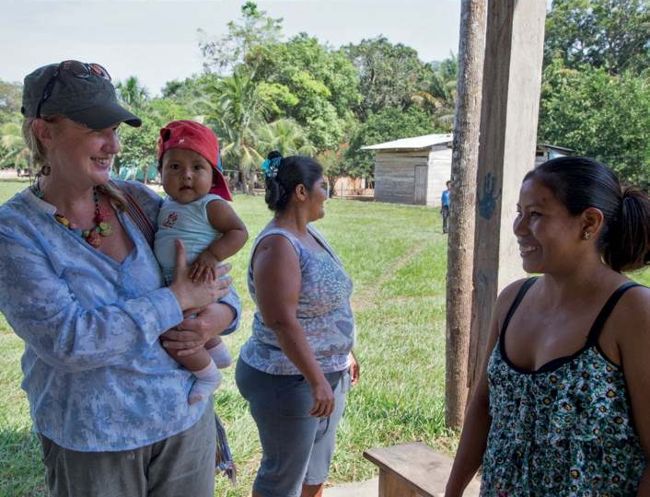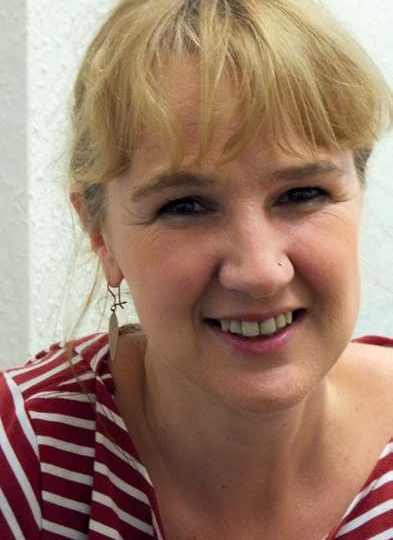More than a job
Jackie Macadam meets Christian Aid’s country manager for Bolivia.
EMMA Donlan wouldn’t trade the view from her window for anything – she overlooks the beautiful mountain vista of Bolivia.
“I love Bolivia,” she says. “There’s something about the place – the best way I can put it is that I like the person I am in Bolivia. Bolivia is breathtaking.”
Which is handy, because Emma is the Christian Aid Bolivia manager, and has been living there with her Bolivian husband, Rolando, and their two children for the past 20 years.
She didn’t start off in Bolivia. “I am originally from Manchester,” she says. “I had an inspiring Spanish teacher who opened my eyes to human rights abuses round the world, especially in South America, and joined a small Amnesty group.
“That led me to doing Latin American Studies at Liverpool University and taking a year out to travel South America as part of my course. I volunteered in an orphanage at La Paz and set up a volunteer programme for future students.
“I realised that my heart lay in wanting to be an aid worker, and after finishing my degree I completed a masters in International Development at Manchester University. Upon graduation I was straight into the deep end, working for a year in the Rwandan refugee camps with people fleeing the genocide there.
“That was crucial training for me; I learned to look for humanity and upholding dignity and the rights of people in even the direst conditions.
“After that experience I got a ‘safe’ desk job for Christian Aid back in London – much to my family’s relief – but one of the first places Christian Aid asked me to do some research work was Bolivia. It had been six years since I’d been there as a student but it was great to be back there. I felt at home.
“It was during this trip I met and fell in love with Rolando, packed up my ‘safe’ job and moved to Bolivia.
“Though Bolivia is nudging towards being a ‘middle-income’ country in that there are some very wealthy people there, there are many, many poor people, especially in the rural areas, who simply don’t have even the basic needs.
“Though Bolivia has been traditionally rich in natural resources, it has also been systematically stripped of these assets.
Three quarters of Bolivia is tropical rainforest and it has managed to retain a good part of that in a pristine state.
Satellite images actually show the deforestation on the Brazillian side and the lush forest on the Bolivian border – but let’s not get cocky. There is a creeping deforestation going on – one of the largest rates of deforestation in the world is in Bolivia.
“One of the projects I am working with is the Church of Scotland Guild backed solar ovens which we initially trialled with six families of indigenous people in the forest communities. The original plan was to have 100 ovens operating in three years but that has been exceeded in two.
“After some trial and error adapting to cooking using the ovens, and a six month trial where they faithfully recorded every single meal, the experiment started working and having some tremendous benefits. The women had much more time to do other things besides cooking, as the solar ovens effectively work like slow cookers, meaning that once they’re loaded up either in the morning or the night before, the women are freed up to participate in other family activities.
Secondly the amount of wood they needed to use up reduced by around three kilos a day per oven! That’s a big difference when you’re trying to protect the habitat.
“Thirdly, and surprisingly, the men folk loved the ovens – and being new gadgets, just had to get involved with them – so we’re finding that now cooking with the ovens is not seen as a ‘woman only’ occupation, but one that the men enjoy joining in with.
“In fact in a recent ‘Great Bolivian Bake Off’ using the ovens, when people from all the communities now using them (there are now over 249 of them in use), some men had become so adept with the ovens that they were not just entering the competition, but winning their heats as well!
“In some ways, when we used to visit communities, the woman were previously almost invisible, so much of their time was spent cooking, but now when we arrive, women are often among the first to greet us and join with us during the meetings we hold there. It’s refreshing and something of a cultural change.
“I am constantly surprised and inspired by the people I work with – people who are so vulnerable to the effects of climate change yet time and again work together to build resilience and meet the challenges of fire or flood.
“Over recent years I have seen how they have worked together to build their resilience and face these challenges.

Emma Donlan with the local community
Identifying where there are risks and planning strategies to overcome them together, for example building refuges on stilts for when the floods come, or gathering natural medicines from the forest to have a community first aid kit and medicine cabinet available for everyone, teaching their children early warning signs and how to react when they see them.
“It’s clear to me by working with Christian Aid and our local partners, that money does not always resolve all the problems – the most important thing is to look at the resources that already exists in the communities, and to value and build on these. Only by working in this way, by empowering people can any change be sustainable.
“As a Christian organisation we have a mandate to speak out against injustice, even when it means not being politically correct.
“I love coming to visit the UK, because I get to meet the communities that support our work in the Amazon and I am inspired by them. It’s not only the money that they donate that I am so appreciative of – but the great sense of solidarity and faith in what we are doing which means the world to me and gives me strength to go on when my own faith and strength weakens and I am feeling overwhelmed.
“My children are enriched too – we are home to international volunteers from all over the world – up to 15 of them at any time – and exposure to all these exciting young people in the Eco-lodge run by Rolando is very stimulating for the whole family.
“David (17) and Bell (14) have grown into very open minded and respectful young people who love being proud members of the local indigenous community.
“My work in the Amazon rain forests is fascinating but the hardest part is the sense of urgency and almost panic when I see the threats to its integrity, the deforestation, the plans to build highways through indigenous territories and hydroelectric dams. There is so much at stake. Not only for the local communities who depend on the forest for their survival, but for the whole planet.
“Other hard parts are the logistics.

Emma Donlan
It’s not easy working in the Amazon. It often takes days to get to the remote communities, travelling by canoe or along muddy tracks on motorbikes or trucks – getting stuck and having to dig ourselves out or flying on planes the size of mosquitoes. Many other NGOs feel it is too expensive or logistically complicated to work in these areas, but because Christian Aid works with local partners and closely with indigenous communities we can get through and we believe it is worth it – although the numbers of people may be small and the communities very dispersed, we believe in the strategic importance of defending the land rights of these communities to protect their forests which are of global importance.
“Christian Aid is more than a job, it brought my husband and I together, it has also helped raise my children, David and Bell who have been lucky to accompany me to the Amazon many times, with values of solidarity, compassion and a true understanding of the social justice and reciprocity – a concept at the heart of Andean culture – where both the giver and receiver are mutually enriched.”